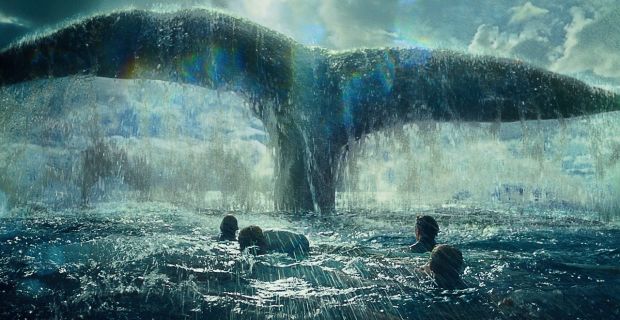
Film: In the Heart of the Sea
Starring: Chris Hemsworth, Brendan Gleeson, Ben Whishaw
Directed By: Ron Howard
Like an old school seafaring yarn, In the Heart of the Sea was primed to be told by a campfire. You know, the kind of story you’d listen to as a kid and sit frozen in disgust and excitement as morsels of the story slowly trickle out of the speaker’s mouth. Whatever real facts the teller was basing the story on will have been dramatized immensely. Then the hook comes, the climax of the story grabs a hold of you and shakes the fear of God into you. What director Ron Howard’s newest film posits is that those stories should make you feel bad for trying to enjoy them.
It’s the year 1850 on the island of Nantucket, Massachusetts. A bright young writer by the name of Herman Melville (Ben Whishaw) visits the home of Tom Nickerson (Brendan Gleeson), a man harboring so much misplaced anger because of a whaling voyage gone wrong. Melville (yes, the same one who wrote Moby Dick) finally breaks down Nickerson’s boorish exterior and gets him to tell the harrowing story of his time on the fateful voyage of the whaling vessel, The Essex, in 1820. The Essex, helmed by Captain George Pollard (Benjamin Walker) and First Mate Owen Chase (Chris Hemsworth), was on its way south from Nantucket to mine for whale oil when something terrible happened. A sperm whale destroyed the ship and left the crew stranded for 90 days. This is the story about their fight to survive. The film is based upon Nathaniel Philbrick’s novel titled In the Heart of the Sea: The Tragedy of the Whaleship Essex.
The film starts from a whale’s POV as it snakes through the depths of the ocean. A showoff-y way to put the expensive visual effects at the forefront, for sure. Something much worse is established with that short intro, though. The stage is set to sympathize with the thing being hunted, the whale. That isn’t necessarily a bad thing, it’s just carried through in such a ham-fisted manner that it brings the whole story to a screeching halt. Are we to feel for the doomed crew on the voyage or are we to believe that they are really the monsters of the story? Anti-whaling (whaling is bad if you didn’t know already) messages cast aside and you have a shallow husk of a story, treating its characters with the same amount of dignity that these people treat whales.
That’s a sign of the times though, right? It was 1820 and the economy was booming because of whale oil; companies constantly sending people out to destroy creatures they didn’t care to learn about because it’s what benefits them. Then why is In the Heart of the Sea so adamant about making these people look like monsters with the thirst to hunt? The stakes are never established. None of them pine for the days when they can return to their families for good. Dicks are measured as a battle for superiority rages on and the crew is forced to the deepest depths of depravity to survive. This is the whale revenge film that you never wanted or asked for—the kind of film that doesn’t know what story to tell and remembers to finger wag towards the end.
On the visual side, my argument about the film’s indifference towards the audience only becomes clearer. Gleeson’s older Nickerson drinks and sits in darkness, ashamed of the things he did on the voyage. Compassion for the man isn’t developed until the closing minutes. Melville’s pen jotting down as much as he can, framed like one of the harpoons the crew used to take down their prey. We get it, the pen is mightier than the harpoon. A fine message if it were recurring during the whole film. The story has some serious commitment issues.
The CGI is glopped onto the screen like whale blubber, creating an unnatural sheen around every character and movement. The visuals are almost like the antithesis to WB’s blockbuster from earlier this year, Mad Max: Fury Road. The film is so clearly shot on a Hollywood back-lot that you’re almost completely emotionally removed from everything. The balance between practical and artificial gets tiresome. The handheld camerawork makes you feel seasick. A wee bit too blunt for my tastes.
Unfortunately, none of the actors are called upon to deliver. Hemsworth recedes to the brooding facade of his Marvel character, just without the humor. Tom Holland, who plays the younger version of Tom Nickerson, has such little screen time to make any kind of impression. After all, this is the kind of film that does too much showing. The actors don’t look natural in their set pieces, like there is no spatial relationship between the characters and what is happening to them.
“Based on the incredible true story that inspired ‘Moby Dick,’” the logline allures. Sometimes we should just leave the most shocking of stories to their original authors, methinks.
GRADE: D
- MOVIE REVIEW: ‘Popstar’ has at least a few hits - June 3, 2016
- MOVIE REVIEW: ‘Neighbors 2: Sorority Rising’ is the rare sequel that tries - May 21, 2016
- MOVIE REVIEW: ‘The Nice Guys’ is a loopy, drunk masterpiece - May 20, 2016
